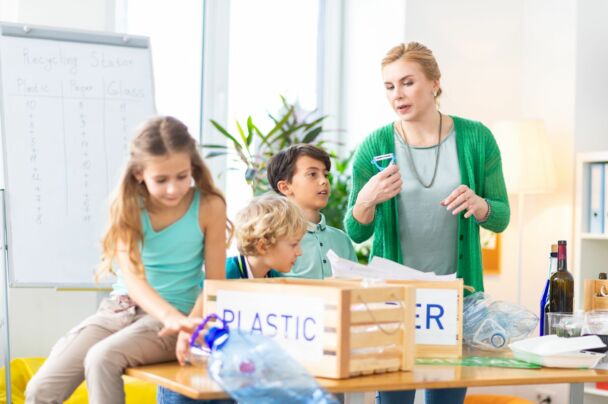Description
Zero-waste is a new strategy to address environmental leadership toward sustainable solutions. It is a philosophy and approach to living that aims to minimize waste generation and reduce environmental impact.
The excessive generation of waste and the lack of awareness about sustainable practices have become significant issues affecting our planet and future generations. Educational systems are called to take action to face the climate challenge, and schoolteachers and leaders can provide their contribution.
This course will introduce participants to the principles of a zero-waste lifestyle and explain how to plan and introduce effective waste reduction strategies in their schools.
During the course, participants will learn about different forms of waste and waste prevention and identify several strategies they can propose to their learners to reduce waste. Thus, they will discuss food waste at school, and discover how to prevent it with reference to the waste cycle and sorting stations.
Participants will also discover the benefits of managing a school garden in terms of both pedagogical practices and sustainable education. They will learn how to create a virtuous zero-km cycle for food production at their school, and how to transform food waste into fruitful composting activities.
The course will also explore how slow fashion and critical consumption can help reduce environmental pollution. Participants will discover how to evaluate the impact of non-ecological dressing and practice several activities to bring their students’ awareness on the same issue and promote school projects on sustainable fashion.
Finally, participants will investigate the plastic crisis, explore clean-up initiatives, and DIY workshops that can help to recycle plastic waste, and explore sustainable alternatives.
By the end of the course, participants will have a deep understanding of sustainable waste management practices and know how to implement them within their schools.
They will feel more confident in addressing the pressing environmental challenges faced by their schools, and in engaging their community in activities that raise awareness and drive change.
What is included
Learning outcomes
The course will help the participants to:
- Understand the principles and philosophy of the zero-waste lifestyle;
- Propose effective waste reduction strategies to raise awareness and promote waste prevention among students;
- Redesign waste cycles and sorting stations to prevent food waste in school;
- Maintain a school garden for pedagogical practices and sustainable education;
- Introduce composting, and reduce the use of plastics and pesticides in school gardens;
- Help learners evaluate the environmental impact of fast fashion and non-ecological dressing;
- Investigate the plastic crisis and its global impact;
- Engage in clean-up initiatives, and explore do-it-yourself (DIY) workshops to recycle plastic waste;
- Discover sustainable alternatives to single-use plastics;
- Foster a culture of sustainability and make a positive impact on the environment.
Tentative schedule
Day 1 – Introduction to the course
- Introduction to the course, the school, and the external week activities;
- Icebreaker activities;
- Presentations of the participants’ schools.
The zero-waste lifestyle
- How many planets do we need?
- Zero-waste: the birth of a new culture;
- Zero-waste and the waste hierarchy;
- Activity: The Ecological Footprint Calculator;
- Activity: Introduction to ‘my consumption diary’
Day 2 – Managing garbage and food waste
- Sorting stations and signs: effective indications and best practices;
- Activity: Design your sign station;
- Food waste: evaluating its impact, and turning wasteful lunches into zero-waste meals;
- How to conduct a lunchroom waste audit;
- Activity: The new life of school waste (brainstorming).
Day 3 – Zero-waste gardening
- How to create and manage a school garden: grow your vegetable and fruits at zero km;
- Avoiding plastics, and pesticides, and reducing water consumption;
- Composting with the classroom;
- Outdoor Activity: Visit a community garden with a practical workshop.
Day 4 – Plastics everywhere: challenges and taking action
- The plastic crisis worldwide: what is plastic, and how it gets to the ocean;
- Answering the plastic crisis: what does the EU say, and what schools can do;
- Thinking systematically about plastic pollution;
- Activity: The life cycle of plastic;
- Activity: Follow the path of the Friendly Floatees;
- Activity: Litter clean-up and Do-It-Yourself (DIY) workshop.
Day 5 – Slow fashion and critical consumption
- Slow fashion and zero-waste dressing;
- Class activities and school projects on sustainable fashion;
- Creating natural DIY products;
- Activity: Create your own zero-waste curriculum (monthly and weekly planning).
Day 6 – Course closure and cultural activities
- Course evaluation: round-up of acquired competencies, feedback, and discussion;
- Awarding of the course Certificate of Attendance;
- Excursion and other external cultural activities.




